Fake News or Irrefutable Proof? Al-Jazeera's latest match-fixing claims
Allegations of spot and match-fixing are once again circling the world of cricket. In May this year, news agency Al-Jazeera showed an initial documentary in which they piece together an alleged betting syndicate that they claim has influenced aspects of various cricket matches around the world. The 2nd instalment of this documentary delving deeper into these allegations was released last week and has made some fairly bold if not unspecific accusations against players from England, Australia and Pakistan.
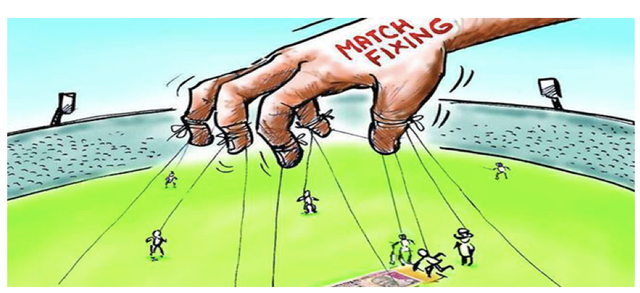
For my part, I watched both documentaries and I am yet to be convinced that they are anything but baseless allegations being spun by a couple of gentleman of highly questionable character. For the remainder of this blog, I will consider several rather obvious holes in the story presented to date by Al-Jazeera.
Harrison and his suitcase full of money
The main protagonist in this story is a gentleman of Indian origin but with ties to Pakistan and the UAE who goes by the name of Munwar and who claims to be the world's premier match fixer. The documentary series begins with Munwar bragging to undercover journalist David Harrison about his ability to buy a fix from just about anyone in the game of cricket. Harrison then proceeds to offer Munwar a suitcase full of cash, stating
"I need to know from you what you are going to do to get that money, to earn it.”
I'm not quite sure what to make of this statement and what role Harrison is actually playing here. If he were truly undercover then presumably the suitcase of money would be a bet or to gain information in regards upcoming fixes in order to bet. However, throughout both documentaries, Harrison never places a bet nor does he receive a prediction for a future game with which he can test this match-fixing system (see more below). Instead, what Harrison appears to be paying for is historical information about how the fixing has gone down in games from up to 8 years ago. Now call me crazy but if I'm part of an international betting/match-fixing syndicate and some foreign bloke offers me a suitcase full of cash not for information with which he can make any profit but for a full rundown of what has happened in the past then I'm going to assume that he's probably a journalist or possibly a police officer!
Fast forward to the end of the 2nd documentary and we are presented with the "gotcha" scene where rather than carrying his hidden cameras, Harrison turns up to a meeting with Munwar accompanied by a full film crew. Munwar's reaction to this is the textbook walk of shame as he quickly leaves the hotel room, being harangued by Harrison as he goes about his role in soiling cricket's reputation. I give Munwar a 2 out of 10 for his wooden performance here. It just doesn't seem believable that he couldn't have seen this coming!
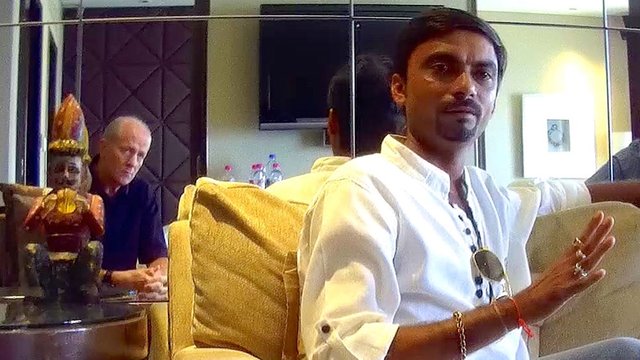
Even if you do believe that Munwar didn't know he was talking to a journalist, the question still remains why would he confess his past crimes to anyone? Throughout the documentaries, Munwar alludes to the sums of money being made on these fixed bets as being in the tens of millions of USD and yet he is willing to give up crucial information about the system and his integral role in the whole process for a relatively small sum of cash. It doesn't make sense!
I can't help but shake the idea that it's actually the journalist that has been played here. If you walk into a room with a shady character and start waving a suitcase full of money around, don't be surprised if he then begins to tell you exactly what you want to hear in order for him to separate you from the case of money! If this were a court of law (and depending upon the result of ongoing investigations these allegations could yet end up being heard in such a venue) then the motives and the character of Munwar, a self-confessed criminal would seriously weaken the strength of his testimony.
The not so great Illusionist
As mentioned above, Munwar never manages to pull off his magic trick of fixing a portion of the match in advance of a game actually taking place. Harrison's contact with him always descends into them discussing past fixes where of course it is easy for Munwar to claim that he has successfully manipulated a portion of the game. We can all predict a result after it's occurred! For my suitcase of money I'd want to see the magic trick done right there in front of me, as opposed to being asked to leave the room then reassured that while I wasn't looking it had happened just as described.
There is one instance where it looks like we might get to see a fix in advance when Munwar claims to be in Australia looking to tamper with certain aspects of both the Big Bash League (BBL) and the Australia v Pakistan Test series that were being played at the time. Harrison calls Munwar to discuss what is happening and whether he has managed to influence any of the upcoming matches. Munwar, in a state of some distress then goes on to criticise a group of greedy Australian cricketers who want more than he and his bosses are willing to pay in order to fix a certain portion of an upcoming BBL game. Munwar goes onto state that his "company" is going to "totally wind-up now and we are going back to India tomorrow". Maybe this sort of thing happens in match-fixing all the time but again I think a genuine piece of investigative journalism would want to see a fix play out in real time and not to be pawned off by a bunch of excuses about the "bloody Australians" wanting over the odds for their part in the corruption.
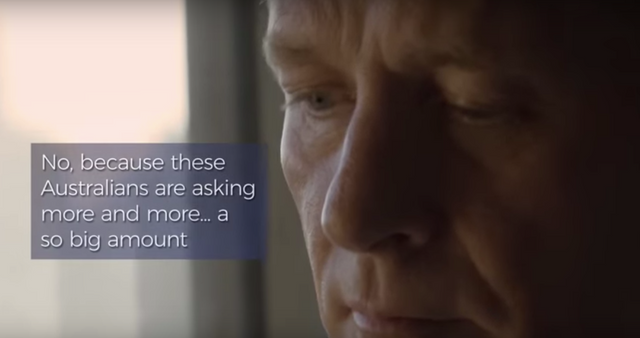
What makes the claims even more unbelievable is that during their next meeting Munwar goes onto state that he did, in fact, fix portions of 4 BBL matches! So it appears some Aussies come cheaper than others but once again the fixers claims can't really be tested in a live situation.
To compensate for this obvious flaw in the logic, Al-Jazeera presents a huge number of recorded telephone conversations between Munwar and an Indian businessman and known associate of a betting syndicate who goes by the name DK. The pair are heard discussing certain games going back to 2010 and the fixes that are in place, with Munwar advising DK on how to bet on the matches in order to maximise returns. Al-Jazeera doesn't reveal the source of these telephone recordings and the majority of the specifics within them e.g. player and team names, have been edited out. Would a state security service or police force willingly hand out recorded phone conversations to news agencies? That would be almost as big a scandal as the match-fixing itself! So if it wasn't the cops then who did make these recordings, how did they do it and what was their motive for releasing them now? None of these questions are tackled within the documentary and instead, the recordings are presented as fact, beyond doubt that Munwar's predictions have come true.
Munwar's happy snaps
Throughout the show, Munwar is presented as having connections to the biggest names in international cricket and he doesn’t hold back on these claims either, stating that pretty much any player has his price and if the returns are right his organisation would be willing to meet the demands of those players.
To prove that Munwar has influence amongst cricket’s biggest stars we are treated to a collection of photographs that have presumably been taken on his smartphone and that show him with the likes of Virat Kohli, Rohit Sharma, Chris Gayle, Darren Sammy, Graeme Swann and Tim Bresnan. When I say that these photos show Munwar “with” these cricketers what I actually mean is that they generally show Munwar in shot with either the cricketers in the foreground or background of the picture. The location of these shots tends to be hotel lobbies, bars and restaurants i.e. public venues where once you’ve established that a team is staying there and if you are willing to hang around for long enough you would easily be able to get such photos.

George Clooney owns a property not a million miles from me, if I hang around outside Waitrose (I assume he wouldn’t shop at Asda with me and the rest of the unwashed masses) I might well be able to get a snap of him popping in for a bottle of Lucozade and a Kit Kat Chunky after a night out but it doesn’t mean that I have an inside track on who he is casting in his next movie! Munwar comes across more like cricket's greatest stalker than a man at the heart of a multi-million dollar scam.
From a cricketing perspective
All in all the documentary claims to have found that Munwar correctly predicts incidents in 25 out of the 26 matches that he talks about. Conversations between Munwar and Harrison as well as Munwar and DK reveal that the primary fix that they are involved with is around session betting. This is where punters bet over/under on a specific number of runs being scored within a defined period of play. The show and Munwar suggest these periods are anywhere between 1 to 10 overs in length and that they always involve batsmen being paid to underperform i.e. the fixers know to bet under during these specific sessions.
To strengthen their argument Harrison and his team approach a couple of London based bookmakers and ask them to run the odds on all the bets that Munkar has suggested that he and his syndicate won as the result of fixing. One bookmaker comes back to say that the odds of Munkar having won on all those bets as a regular punter would be 9.2million to 1, the other gives odds of 30 million to 1! The producers of the documentary use the stats to show that Munkar isn't just a cricket fan who got lucky with a couple of outlandish bets, he must have fixed the parts of these matches as he claims!
In 2010 a pair of Pakistan's bowlers and their captain were found guilty of spot-fixing having been paid by a betting syndicate to bowl no-balls (overstepping the white line) on demand. This has generally been considered a far easier variable to manipulate than runs with a specific session
However, the incredibly long odds and the fact that the batsmen that Munkar allegedly had in his pay delivered almost every time doesn't add up for me, an ardent cricket fan and long-time player of the game. For example, on several occasions, Munkar advises DK to bet on a specific over within a match being a maiden. A maiden is an over (6 balls) in which no runs are scored. Certainly, within Test Match cricket they are not rare (15-20% of a games overs will be maidens), however, they are quite difficult to control just from a batsman's point of view. What happens if the bowler bowls a no-ball or a wide? What if the batsman plays a defensive shot which he edges through the in-field for runs? These are equally common occurrences and they would ruin any attempt at the spot-fixing being suggested or at the very least mean that you weren't seeing quite as consistent returns as Munkar is claiming to be able to deliver. Furthermore, even within the longer periods of 10 overs, you would likely need to have both batsmen at the crease in on the scam and potentially the next man coming in also part of the deception should one of those batsmen get out otherwise how can you say with any great certainty that the runs scored will be lower than the market rate? You might be able to shift the odds in your favour in much the same way a Blackjack player does when he counts cards but the idea that such fixing would offer you a 96% success rate (25 out of 26 matches) seems highly doubtful to anyone who has played and watched as much cricket as me and can appreciate the huge variety of results that a period of cricket can provide whether it's planned or not.
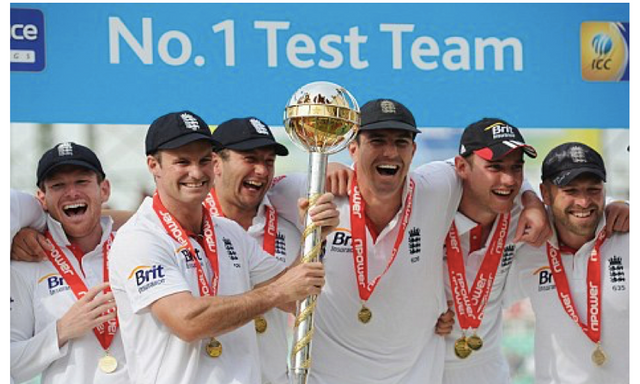
While no specific details of the players and the sessions supposedly fixed are revealed during the show, the finger is pointed primarily at England and Australia players around the 2010-2012 period. This includes Test Matches involving England and India in 2011, a series that England would go on to win 4-0 to become the number 1 ranked team in Test cricket. It doesn't sit well with me to suggest that such a talented, focused and well-compensated set of players (the report suggests 7 England players are involved) would also be spot-fixing on the side. While I tend to agree with Munkar that ultimately everyone does have their price, this particular group of cricketers doesn't look like an easy target to corrupt on such a large scale.
Beware of big media, long live the blockchain!
Of course, the England and Wales Cricket Board and Cricket Australia have been quick to condemn the reports and asked for all evidence used to make the documentary to be passed onto themselves and the ICC (cricket's governing body) for detailed investigation. These rumors and wild accusations need to be properly and thoroughly investigated and where any wrongdoing is found then the guilty parties must be punished severely. That being said I remain highly skeptical of the Al-Jazeera report, the way it has been presented and the sources that they have used to try and join up the dots. This whole story reeks of half-baked, sensationalist journalism designed to peddle copy and push up views on social media. Shame on Al-Jazeera for broadcasting such biased material without having considered the above and the effect it would have on cricket! In this modern era of fake news, there has never been a better time to join communities like Steemit where free speech and objective thinking still hold value!
Originally posted on my Scorum Account : https://scorum.com/en-us/cricket/@talesfrmthecrypt/fake-news-or-irrefutable-proof-al-jazeera-s-latest-match-fixing-claims
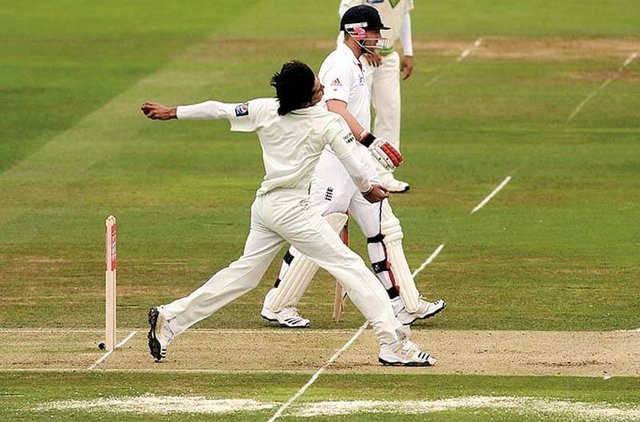
As a follower of @followforupvotes this post has been randomly selected and upvoted! Enjoy your upvote and have a great day!